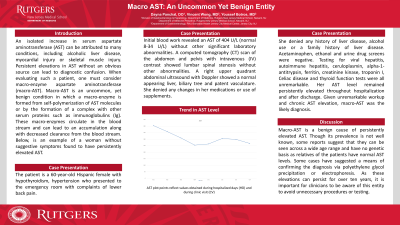Back


Poster Session C - Monday Afternoon
Category: Liver
C0600 - Macro AST: An Uncommon Yet Benign Entity
Monday, October 24, 2022
3:00 PM – 5:00 PM ET
Location: Crown Ballroom

Has Audio

Dayna Panchal, DO
Rutgers New Jersey Medical School
Newark, NJ
Presenting Author(s)
Dayna Panchal, DO1, Vincent Wong, MD1, Youssef Botros, MD2
1Rutgers New Jersey Medical School, Newark, NJ; 2Jersey City Medical Center, Jersey City, NJ
Introduction: An isolated increase in serum aspartate aminotransferase (AST) can be attributed to many conditions, including alcoholic liver disease, myocardial injury or skeletal muscle injury. Persistent elevations in AST without an obvious source can lead to diagnostic confusion. When evaluating such a patient, one must consider macro-enzyme aspartate aminotransferase (macro-AST). Macro-AST is an uncommon, yet benign condition in which a macro-enzyme is formed from self-polymerization of AST molecules or by the formation of a complex with other serum proteins such as immunoglobulins (Ig). These macro-enzymes circulate in the blood stream and can lead to an accumulation along with decreased clearance from the blood stream. Below, is an example of a woman without suggestive symptoms found to have persistently elevated AST.
Case Description/Methods: The patient is a 60-year-old Hispanic female with hypothyroidism, hypertension who presented to the emergency room with complaints of lower back pain. Initial blood work revealed an AST of 404 U/L (normal 8-34 U/L) without other significant laboratory abnormalities. A computed tomography (CT) scan of the abdomen and pelvis with intravenous (IV) contrast showed lumbar spinal stenosis without other abnormalities. A right upper quadrant abdominal ultrasound with Doppler showed a normal appearing liver, biliary tree and patent vasculature.
She denied any changes in her medications or use of supplements. She denied any history of liver disease, alcohol use or a family history of liver disease. Acetaminophen, ethanol and urine drug screens were negative. Testing for viral hepatitis, autoimmune hepatitis, ceruloplasmin, alpha-1-antitrypsin, ferritin, creatinine kinase, troponin I, Celiac disease and thyroid function tests were all unremarkable. Her AST level remained persistently elevated throughout hospitalization and after discharge. Given unremarkable workup and chronic AST elevation, macro-AST was the likely diagnosis.
Discussion: Macro-AST is a benign cause of persistently elevated AST. Though its prevalence is not well known, some reports suggest that they can be seen across a wide age range and have no genetic basis as relatives of the patients have normal AST levels. Some cases have suggested a means of confirming the diagnosis via polyethylene glycol precipitation or electrophoresis. As these elevations can persist for over ten years, it is important for clinicians to be aware of this entity to avoid unnecessary procedures or testing.
Disclosures:
Dayna Panchal, DO1, Vincent Wong, MD1, Youssef Botros, MD2. C0600 - Macro AST: An Uncommon Yet Benign Entity, ACG 2022 Annual Scientific Meeting Abstracts. Charlotte, NC: American College of Gastroenterology.
1Rutgers New Jersey Medical School, Newark, NJ; 2Jersey City Medical Center, Jersey City, NJ
Introduction: An isolated increase in serum aspartate aminotransferase (AST) can be attributed to many conditions, including alcoholic liver disease, myocardial injury or skeletal muscle injury. Persistent elevations in AST without an obvious source can lead to diagnostic confusion. When evaluating such a patient, one must consider macro-enzyme aspartate aminotransferase (macro-AST). Macro-AST is an uncommon, yet benign condition in which a macro-enzyme is formed from self-polymerization of AST molecules or by the formation of a complex with other serum proteins such as immunoglobulins (Ig). These macro-enzymes circulate in the blood stream and can lead to an accumulation along with decreased clearance from the blood stream. Below, is an example of a woman without suggestive symptoms found to have persistently elevated AST.
Case Description/Methods: The patient is a 60-year-old Hispanic female with hypothyroidism, hypertension who presented to the emergency room with complaints of lower back pain. Initial blood work revealed an AST of 404 U/L (normal 8-34 U/L) without other significant laboratory abnormalities. A computed tomography (CT) scan of the abdomen and pelvis with intravenous (IV) contrast showed lumbar spinal stenosis without other abnormalities. A right upper quadrant abdominal ultrasound with Doppler showed a normal appearing liver, biliary tree and patent vasculature.
She denied any changes in her medications or use of supplements. She denied any history of liver disease, alcohol use or a family history of liver disease. Acetaminophen, ethanol and urine drug screens were negative. Testing for viral hepatitis, autoimmune hepatitis, ceruloplasmin, alpha-1-antitrypsin, ferritin, creatinine kinase, troponin I, Celiac disease and thyroid function tests were all unremarkable. Her AST level remained persistently elevated throughout hospitalization and after discharge. Given unremarkable workup and chronic AST elevation, macro-AST was the likely diagnosis.
Discussion: Macro-AST is a benign cause of persistently elevated AST. Though its prevalence is not well known, some reports suggest that they can be seen across a wide age range and have no genetic basis as relatives of the patients have normal AST levels. Some cases have suggested a means of confirming the diagnosis via polyethylene glycol precipitation or electrophoresis. As these elevations can persist for over ten years, it is important for clinicians to be aware of this entity to avoid unnecessary procedures or testing.
Disclosures:
Dayna Panchal indicated no relevant financial relationships.
Vincent Wong indicated no relevant financial relationships.
Youssef Botros indicated no relevant financial relationships.
Dayna Panchal, DO1, Vincent Wong, MD1, Youssef Botros, MD2. C0600 - Macro AST: An Uncommon Yet Benign Entity, ACG 2022 Annual Scientific Meeting Abstracts. Charlotte, NC: American College of Gastroenterology.
